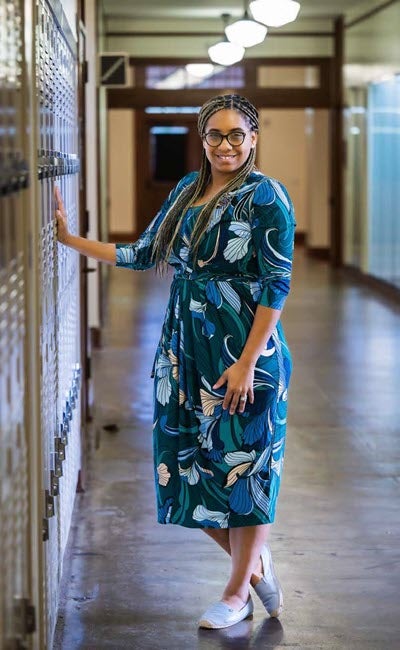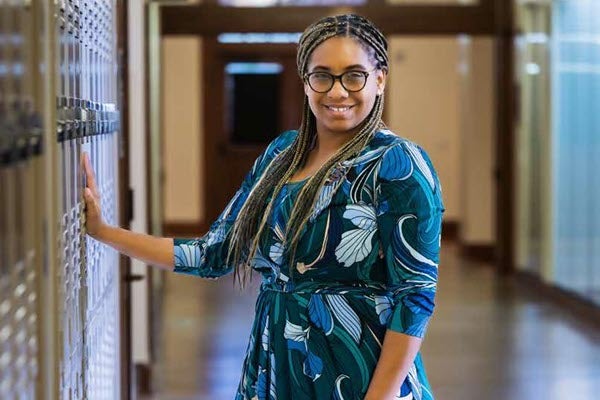Portia Hopkins remembers when she was a little girl helping her mother, Denise, a beautician and entrepreneur, clean the two hair salons she owned in Houston and Tomball. She also remembers her mother visiting women’s prisons in Texas during Christmas to help inmates fix their hair.
Hopkins, fearing for her mother’s safety, would ask her why she did it. “You have to be kind to people,” her mother would say. “You never know what people are going through. No one should feel that they are not welcome in your presence. You have to be kind and humble.” Hopkins took those words to heart and made that philosophy her guiding principle in life.

In her new role as university historian at Rice, Hopkins continues to live by her mother’s words by helping to expand the archives at Rice and taking on a series of projects that advance the understanding of the rich diversity of the campus and Houston communities. “I want to take a holistic approach in telling the Rice story,” she said.
Recently, Hopkins gave a lecture in which she traced the history of Blacks at Rice by examining university records. She talked about how in the early 1900s the first Blacks at Rice were maintenance workers and cooks. She went on to discuss the integration of the university during the 1960s and the protest movements that followed as Black students sought more faculty that looked like them.
Hopkins emphasizes that the history she likes to tell is not only based on negative actions. “Everybody has story of micro-aggression and I don’t need to do research on that,” she said. “I’m more interested in how students found community and how faculty and staff helped them feel like they were part of the community.”
Hopkins added, “You can talk about racial epithets that people have said, but those things are hurtful. I don’t want to discount those moments of trauma because it is traumatizing when somebody causes you pain. But there were people here who were very welcoming and who were very open and very kind and wanted to see change and sought change early on.”
She points to a report that Karen Kossie-Chernyshev ’85, a Rice alum and professor of history at Texas Southern University, wrote that recounts how Black women who worked at Rice helped Black students overcome cultural shock by supporting them and making them feel welcome to what was then a predominantly white institution. Kossie-Chernyshev was the first African American woman to earn a Ph.D. from Rice in 1998. She also earned a B.A. and M.A. degrees from Rice.
“That’s what I’m interested in finding,” Hopkins said, “little pockets of what we call ‘activist allyship’ in which people create a culture of care.” Another example of this allyship was exhibited when student leaders at Hanszen College spoke out in support of Black Lives Matter.
Her research of the Black community at Rice is drawing praise from a number of people. “Dr. Hopkins is undertaking profoundly important work on Black students, staff and faculty at Rice and on the history of the university as it intersects with the larger history of Black Houston as well,” said Alexander X. Byrd ’90, vice provost for Diversity, Equity and Inclusion and associate professor of history.
Sherwin K. Bryant, director for the Center for African and African American Studies, said, “Dr. Hopkins’ research on the presence of people of African descent at Rice represents a bold inquiry into the Black presence at Rice. I find her effort to archive and unearth this history both urgent and necessary.”
Hopkins is extending her research and collaboration to the Black Houston communities. She was instrumental in starting Black Houston(s) Symposium, a platform for community members and scholars to come together, network and discuss social issues that affect their neighborhoods. The annual symposium lasts two days, one of which takes place at the African American History Research Center in Houston’s Fourth Ward and another on the Rice campus. The topics of discussion this March ranged from preserving and restoring Black cemeteries to the study of murals and Black landmarks to a panel discussion titled “Power, Policing & Local Resistance(s).”
That’s what I’m interested in finding. Little pockets of what we call ‘activist allyship’ in which people create a culture of care.
— Portia Hopkins
She is also helping with the Pleasantville Project by recording the oral histories of the people who live there. Pleasantville, a Black neighborhood located near Houston’s commercial port, was once a flourishing community, but now faces a series of environmental and social challenges. Hopkins has been collecting oral histories and archival materials and is housing them in the Woodson Research Center at Rice.
For Hopkins, collecting histories and telling stories of people who may not have had a voice before has long been an interest. Born in Sacramento, California, she grew up in Tomball and attended Klein Oaks High School, where a teacher sparked an interest in her to pursue history as a career. Her interest in history was deepened further when she took a class by Steven Mintz at the University of Houston. “Dr. Mintz was willing to do the difficult histories — the genocide that was done to the indigenous people and show how terrible enslavement was,” she said. “He made history about more than just dates to us.”
Hopkins went on to receive a bachelor’s degree in history from Texas Christian University, a master’s degree in American studies from the University of Alabama and a doctorate in American studies from the University of Maryland.
“After I got my Ph.D., I wanted to make sure that everything I was doing was centered on communities and meaningful because I wanted to make an impact in people’s lives.” She also wanted to honor her mother’s belief in helping others. “I wanted to follow in my mother’s footsteps. She always said, ‘If you’re not giving back to the community, then what are you doing?’”
David D. Medina
Director, Multicultural Community Relations Public Affairs

